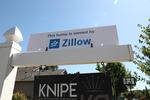Earlier this year, Brian Lee and his wife became empty nesters. They’d lived in their family home in Beaverton for 25 years. They looked at the house, with the apple tree in the backyard and their son’s name still painted in the upstairs closet. Then they sold it to Zillow.
We all know Zillow.com as a place to browse homes for sale. A staggering 194 million people visit the site every month. Now Zillow is pivoting, bringing its immense resources to the tangible business of buying and selling houses itself. And if you live in the Portland/Vancouver area, Zillow might just buy your home, for cash.

This three bedroom Beaverton, Ore., home is one of the first in the Portland-area that Zillow bought directly as part of "Zillow Offers."
Kate Davidson / OPB
Zillow has launched what it calls "Zillow Offers" in 17 markets and counting, including Portland in July.
The company is marketing convenience – for a fee. It’s betting on the idea that, for sellers, it’s worth accepting a non-competitive bid from an internet giant if it means a quicker and simpler sale.
“Zillow Offers is the new way to sell your house,” said the president of Zillow brand Jeremy Wacksman. “Ultimately you want to make moving as easy as pressing a button on your phone.”

Beaverton, Ore., August 27, 2019. This was one of the first homes in the Portland area that Zillow purchased as part of its new business buying and selling houses directly.
Kate Davidson / OPB
If Zillow likes a home, it promises a cash offer in a matter of days. It then deducts a roughly 7.5% fee (somewhat higher than a standard real estate commission) as well as repair costs (usually about $12,000). The seller picks their closing date. And that moldy shower upstairs? Just leave it for Zillow to handle.
Brian Lee got his final offer five days after contacting Zillow: $463,000 for his three bedroom, three bath home – minus the repair costs and convenience fee. Lee thought the price was fair. Plus, it was cash.
“It’s a done deal,” he said. “No contingencies, no surprises. They’re willing to bid this. They’ve done their homework. They’re ready to go and no screwing around.”
He turned over the keys and hightailed it to Bend with his wife.
“The air is so fresh in the morning. It’s cool, crisp. I love it,” he said from his new city days later.
"Ibuying," or instant buying, is a small but growing part of the real estate market. There are some big questions as Zillow muscles into the game, alongside companies like OpenDoor and OfferPad.
First of all, is it good for homeowners?

Brian Lee in Bend, Ore., on Sept. 11, 2019. Lee sold his family home of 25 years to Zillow.
Emily Cureton / OPB
According to the laws of Real Estate 101, the best way to get the best price on a house is to make sure a bunch of people see it.
"Supply and demand, right?" said Laurie Thiel, president-elect of the Portland Metropolitan Association of Realtors. "So if there's 12 buyers out there and there's two homes to look for, you're gonna get a higher price. Because those other 11 buyers aren't necessarily going to win the bid on your house, but they will help drive the price higher."
“Whereas if you just have one buyer bidding on it, it’s their price,” she added.
“Their price” – even if it’s below market value - might be the right price for some sellers. Thiel said iBuying can be a good alternative for homeowners who have to move fast for a job or face situations that make open houses difficult.
There are downsides for sellers. Research shows the fees iBuyers charge can be significantly higher than traditional broker fees, which increases the cost to sellers.
Then there’s the question: Is buying and selling houses good for Zillow itself?
The whole idea, for Zillow, is to buy homes near market value, do minimal repairs, and sell them quickly. In Brian Lee’s old house in Beaverton, that meant throwing up a coat of paint and extending the deck, but not necessarily replacing the wall to wall carpet. Zillow wants to move fast and grow fast.
“Three to five years from now, we hope to be buying and selling 5,000 homes a month, which is around $20 billion a year in revenue,” said Zillow’s Jeremy Wacksman.

Beaverton, Ore., August 27, 2019. Through its program "Zillow Offers," Zillow buys homes around Portland, does minimal repairs, and resells them.
Kate Davidson / OPB
Churning through houses without making substantial improvements is a low margin business, however – one that’s losing Zillow money.
Zillow Offers lost more than $71 million last quarter, before taxes. Much of that loss came from costs the company is incurring as it ramps up in size, with plans to operate in more than 20 markets next year, including Los Angeles.
But Zillow Offers is also losing money when it buys and sells individual homes – a loss of about $3,000 per home in the second quarter of this year.
To help solve that problem, Zillow wants to become a one-stop real-estate shop. It recently bought a mortgage company. It plans to provide title and escrow services. Wacksman said profits will come through volume and efficiency.
At least one Zillow-watcher thinks it might not matter to the company whether or not it profits from buying and selling homes. Brad Erickson, a research analyst with the investment bank Needham and Company, said Zillow's larger goal is different.
Zillow’s bread and butter – its truly profitable business - is selling ad space to real estate agents online. Erickson believes the website’s usefulness to those agents has peaked.
“So they’re trying to do what we in internet call going down the funnel,” he said.
In other words, they’re trying to get closer to the customer.
“The hope is if you get closer to the customer with things like offering mortgage originations, buying and selling homes, that more often than not, people will come directly to the site, which will give them greater leverage to sell advertising dollars to those realtors,” he said.
Meanwhile, the day before it hit the market, Brian Lee’s former house in Beaverton had already been viewed 1,800 times on Zillow.com.
“This is a new idea. We’ve all seen what Amazon did to the retail industry. Maybe the housing industry is gonna undergo a major change, starting with this process,” said Lee.
That change might be cultural more than anything else. It’s the idea that with the touch of a virtual button, you can walk away from your family home of 25 years, with the apple tree in back and your child’s name painted in the closet. And that it may be worth getting less for that freedom.
